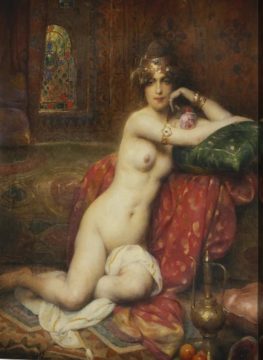Justin E. H. Smith in his Substack newsletter, The Hinternet:
 A curious passage in Salammbô, Gustave Flaubert’s 1862 Orientalist phantasmagoria, describes a mostly forgotten practice of the ancient Carthaginians:
A curious passage in Salammbô, Gustave Flaubert’s 1862 Orientalist phantasmagoria, describes a mostly forgotten practice of the ancient Carthaginians:
[A group of Barbarian soldiers] ran to see it. It was a lion, attached to a cross by its four limbs like a criminal. Its enormous muzzle was falling upon its chest, and its two front paws, half-disappearing beneath the abundance of its mane, were spread wide like the two wings of a bird. Its ribs, all lined up, jutted forth beneath its taut skin; its hind legs, nailed alongside one another, rose up somewhat; and the black blood, pouring through its hairs, had collected in stalactites at the end of its tail that hung straight down along the length of the cross. The soldiers amused themselves with it; they called it consul and citizen of Rome and threw pebbles at its eyes to chase away the flies.
One hundred steps further they saw two more, then suddenly there appeared a long line of crosses bearing lions. The ones had been dead for so long that only the debris of their skeletons remained on the wood; others, half-eaten, twisted their faces into a horrible grimace; some of them were enormous, the tree of the cross folded beneath them and they swung in the wind, as above their heads bands of crows circled in the air without stopping. Thus did the Carthaginian peasants avenge themselves when they captured a ferocious beast; they hoped by this example to terrify the others. The Barbarians, when they had stopped laughing, fell into a long astonishment. “Who are these people,” they wondered, “who amuse themselves by crucifying lions!?” [Emphasis added].
Flaubert’s novel had been among the readings in preparation for my stay at the École Normale Supérieure in Tunis earlier this month. I am probably as much in love with Flaubert as with any author — I’ve written in this space before of the ecstasies to which his “Saint Julien L’Hospitalier” has brought me. But previously I could never finish Salammbô, written in part during his own sojourn in Tunis and vicinity in order to escape the stupid controversy in his home country over the purported obscenity of Madame Bovary. It took a stay in Tunisia for me to be able to feel my way into the novel, which reimagines ancient events mostly drawing on source material from Polybius, and other Roman authors who related the history of the Punic wars.
More here.
